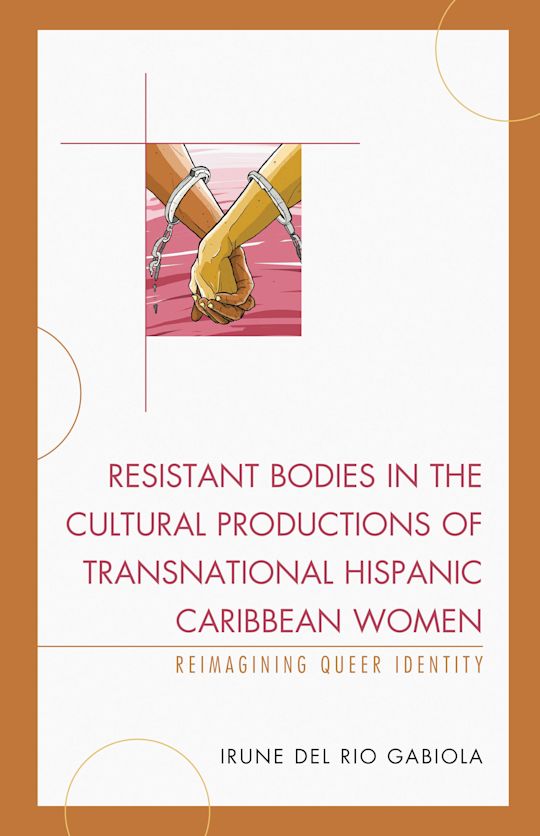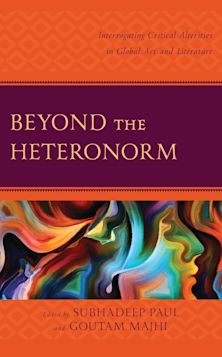- Home
- ACADEMIC
- Gender & Sexuality Studies
- Gender and Sexuality Studies - Other
- Resistant Bodies in the Cultural Productions of Transnational Hispanic Caribbean Women
Resistant Bodies in the Cultural Productions of Transnational Hispanic Caribbean Women
Reimagining Queer Identity
Resistant Bodies in the Cultural Productions of Transnational Hispanic Caribbean Women
Reimagining Queer Identity
You must sign in to add this item to your wishlist. Please sign in or create an account
Description
Resistant Bodies in the Cultural Productions of Transnational Hispanic Caribbean Women: Reimagining Queer Identity examines the art created by several Caribbean women who use literature, film, graphic novels, music, testimonios, photographs, etc. to convey social justice, democracy, and new ways of re/imaging marginal identities. In using Chela Sandoval’s theories on methodologies of the oppressed, Irune del Rio Gabiola argues how the tactics Sandoval offers can be productively applied to the cultural productions analyzed. The author explores how the protagonists of all the cultural productions this book focuses on developing tactics to create new possibilities and alternatives for self-fashioning. Particularly, del Rio Gabiola reconsiders concepts such as shame, failure, unbecoming, hermeneutics of love or flexible bodies as methodologies of the oppressed that propose decolonizing emancipatory techniques in a transnational arena.
Table of Contents
Introduction: Dismantling Cultural Paradigms in search of Inclusivity and Revolutionary Love
Puerto Rico
Chapter 1: Shame and Failure: Positive Narratives to Re/image Queer Identity in the
Transnational Puerto Rican Context
Chapter 2: A Queer Way of Family Life: Narratives of Time and Space in Mayra Santos-Febres’s Sirena Selena vestida de pena
Cuba
Chapter 3: Divas, Atrevidas y Entendidas; Cuban Hip Hop Group Krudas Cubensi ConQueering Love Across the Transnational Space
Chapter 4: Unbecoming Cuban-American: An Analysis of Cristy Road’s Graphic Narratives
The Dominican Republic
Chapter 5: Flexible Bodies in Cyberspace: Representations of Dominicanidad in the art of Raquel Paiewonsky
Chapter 6: The Lesbian Body as Home: Queering Dominican Women’s Experiences
Conclusion: Emancipatory Techniques in Contemporary Art in the Transnational Caribbean Context
References
About the Author
Product details
| Published | 27 Dec 2016 |
|---|---|
| Format | Ebook (Epub & Mobi) |
| Edition | 1st |
| Extent | 168 |
| ISBN | 9781498520782 |
| Imprint | Lexington Books |
| Illustrations | 5 b/w illustrations; 7 b/w photos |
| Series | Latin American Gender and Sexualities |
| Publisher | Bloomsbury Publishing |
About the contributors
Reviews
-
Irune del Rio Gabiola’s work analyzes the lesbian body as a site that re-envisions notions of un/becoming, queer family, space, and belonging. Drawing on Chela Sandoval’s ‘methodology of the oppressed,’ del Rio Gabiola carefully examines the work of Caribbean writers and artists and demonstrates how their particular representation of queer and transgendered bodies productively disrupts dominant notions of national identity and authority. This book brings together remarkable works from a diverse array of media (i.e. novel, graphic novel, hip hop, performance art) connected to their shared thematic attention to issues of gender, sexuality, and transnational mobility. del Rio Gabiola convincingly argues that these works, collectively, invite us to reimagine the power of the lesbian body.
Dara E. Goldman, University of Illinois
-
Through centering queer bodies and experiences as a site of knowledge production, Resistant Bodies in the Cultural Productions of Transnational Hispanic Caribbean Women: Reimagining Queer Identity, is a welcomed addition to the emergent body of literature centered on the critical arts and social change.
Tanya Saunders, Associate Professor of Latin American Studies, University of Florida
-
Scholar Irune del Rio Gabiola is best known for her queer feminist perspective and interdisciplinarity. In Resistant Bodies, a meticulous sociocultural contextualization supports the solid construction of densely theoretical arguments, interweaving themes of family/home, corporality, philosophy, shame, and pride. Analyzing diverse media from photography to hip-hop, del Rio Gabiola celebrates the transnational performative empowerment of queer women of the Spanish speaking Caribbean.
Sara E. Cooper, California State University, Chico



































